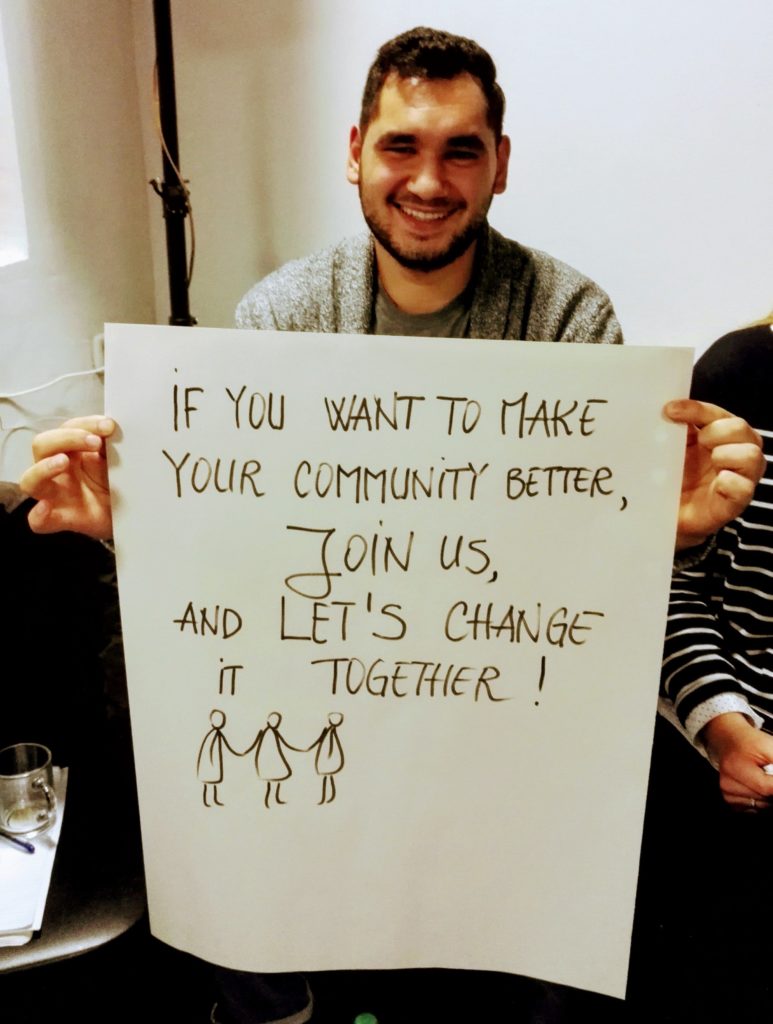ECON supports organizers who are building a counterforce to right wing extremism, racism, and nationalism in Europe.
Meeting the populist moment
“Right wing populism” and the “closing of civic space” are terms on a lot of people’s lips at the moment, and for good reason. However, these term are often recited in a rather abstract way. It’s as if we are reporting on the weather! But the closing of civic space is not inevitable, and organizing–with its focus on building local leadership and strong local organizations–is a powerful tool against those that would use division and hatred to advance a reactionary agenda.
 What’s more, there is a danger of this closing happening on the “micro” level as well; as citizens see there is no hope, apathy sets in. As neighbors are told to distrust their neighbors because they are different, they withdraw into themselves and their families. This contraction of a day-to-day public life leaves the playing field open for demagogues to gain power.
What’s more, there is a danger of this closing happening on the “micro” level as well; as citizens see there is no hope, apathy sets in. As neighbors are told to distrust their neighbors because they are different, they withdraw into themselves and their families. This contraction of a day-to-day public life leaves the playing field open for demagogues to gain power.
Organizing as a counterforce
As a practice, a community organizer must push through distrust in a community by doing what skeptics in the community would warn, “we just don’t do here.” The community organizer knocks on the door of community members—even those that they do not know—to bring a piece of civic life directly to a community members’ doorstep.
The community organizer builds local groups across traditional lines of division, whether they be race, or geography, or history. The community organizer develops local leaders to not only get involved in their neighborhoods, but to develop a larger power analysis of the world they live in.
If the community organizer is the activator, then the community members are the leaders, acting with a new sense of self and community. All of this adds up to a very powerful—and very concrete—antidote to the closing of civic space.
Building power from the bottom up
Community organizing starts with a clear analysis of power: who has it and who does not? Organizers build power by doing painstaking outreach into local communities, identifying and training leaders, and waging campaigns to win material gains and shift power relations in society.

Starting at the margins of society
“Leadership” does not always take the form you think it will take. It is not a politician in a suit standing in front of a crowd. Instead, leadership in a community organizing campaign comes from the margins. It is the group of mothers fighting a discriminatory school policy. It is the the poor neighborhood fighting for basic services in their part of the city.
An organizer must focus on building strong, locally rooted organizations by working on the ground in the communities that are being targeted by right wing populist movements. Rather than using the opposition’s tactics of divide and rule in marginalized communities, the community organizer must root his or her work in the vision and practice of social solidarity.
A New Concept of Civil Society
“Community organizing is not a ‘methodology,’ it is an investment in a new concept of civil society.”
 These are the words of an ECON leader from Hungary. Community organizing is still an emerging sector in the constellation of civil society and NGO work in Europe. At the same time the interest in organizing is growing rapidly. However, we do not believe in promoting community organizing as just a “new approach” to community work.
These are the words of an ECON leader from Hungary. Community organizing is still an emerging sector in the constellation of civil society and NGO work in Europe. At the same time the interest in organizing is growing rapidly. However, we do not believe in promoting community organizing as just a “new approach” to community work.
Rather, we believe community should be understood in the context of shifting power from those who have it those who do not. And it should be understood in the context of what it can accomplish: from the mobilization in Banksa Bystrica, Slovakia that united the community in opposition to the neo-nazi governor of the region, to the campaign to fight for decent housing in Ireland which brought together a traditional working class Irish community with migrants moving into the neighborhood.
In short, organizing is not just a form of citizen participation, it is a way that marginalized communities can take control of their own affairs and build the power they need to create structural change in society.
